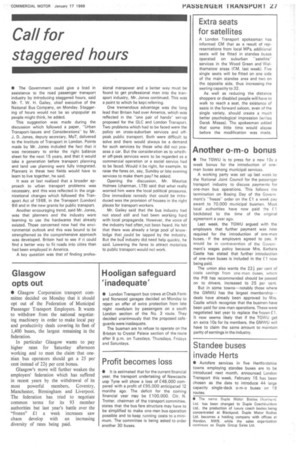Call for staggered hours
Page 29

If you've noticed an error in this article please click here to report it so we can fix it.
• The Government could give a lead in assistance to the road passenger transport industry by introducing staggered hours, said Mr. T. W. H. Gailey, chief executive of the National Bus Company, on Monday. Staggering of hours would not be so unpopular as people might think, he added.
This suggestion was made during the discussion which followed a paper, "Urban Transport-Issues and Considerations" by Mr. J. D. Jones, deputy secretary, MoT, delivered to the Institute of Transport in London. Points made by Mr. Jones included the fact that it was necessary to strike the right balance sheet for the next 15 years, and that it would take a generation before transport planning and land use planning were fully integrated. Planners in these two fields would have to learn to live together, he said.
It was at last realized that a broader approach to urban transport problems was necessary, and this was reflected in the organizational changes which followed the Transport Act of 1968, in the Transport {London) Bill and in the new grants for public transport.
Another encouraging trend, said Mr. Janes, was that planners and the industry were learning to use the hardwares that already existed. Those concerned now had the environmental outlook and this was bound to be strengthened as the comprehensive approach was developed. Britain had to see if it could find a better way to fit roads into cities than had been employed in America.
A key question was that of finding profes sional manpower and a better way must be found to get professional men into the transport industry, Mr. Jones continued. This was a point to which he kept referring.
One tremendous advantage was the long lead that Britain had over America, which was reflected in the -one pair of handsset-up proposed for the GLC and London Transport. Two problems which had to be faced were the policy on cross-suburban services and offpeak public transport. Both were difficult to solve and there would always be a demand for such services by those who did not possess a car. But the consideration as to whether off-peak services were to be regarded as a commercial operation or a social service had to be faced. Would it be right, for example, to raise the fares on, say, Sunday or late evening services to make them pay? he asked.
Opening the discussion, Mr. Maurice Holmes {chairman, LTB) said that what really worried him were the local political pressures. One immediate remedy that could be introduced was the provision of houses in the right places for transport workers.
Mr. Gailey said that the bus industry had not stood still and had been working hard with local propaganda. However, the voice of the industry had often.not been heard. He felt that there was already a large pool of knowledge that icould be tapped by the industry. But the bus industry did need help quickly, he said. Lowering the fares to attract motorists to public transport would not work.








































































































